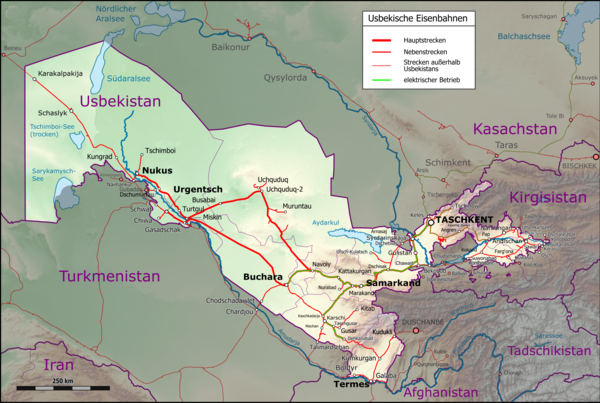Rail transport in Uzbekistan
This article needs to be updated. (February 2018) |
| Uzbekistan Rail Network | |||||
|---|---|---|---|---|---|
 Bukhara train station | |||||
| Operation | |||||
| National railway | Uzbek Railways | ||||
| System length | |||||
| Total | 4,714 kilometres (2,929 mi) | ||||
| Track gauge | |||||
| Main | 1,520 mm (4 ft 11+27⁄32 in) | ||||
| Features | |||||
| No. bridges | 132 | ||||
| Longest bridge | Turtkul 4,065 metres (13,337 ft) | ||||
| No. stations | 1332 | ||||
| Highest elevation | 1,444 metres (4,738 ft) | ||||
| |||||
As of March 2017, the total length of Uzbekistan's main railway network is 4,714 kilometres (2,929 mi) (2,500 kilometres (1,600 mi) of which is electrified).[1] A large percentage of the system's track requires major repair. The main line is the portion of the Transcaspian Railroad that connects Tashkent with the Amu Darya. There are rail links with Kazakhstan, Kyrgyzstan (see Trans-Caspian Railway), Tajikistan, Afghanistan, and Turkmenistan. Suburban traffic only exists around Tashkent.
High speed rail
[edit]The Tashkent–Samarkand high-speed rail line; a line upgraded to high speed operation started operation in September 2011.[2]
Trams
[edit]Uzbekistan has a tram in located in Samarkand. The modern, electrified system opened its first line in 2017, and is the first system to operate in Samarkand since the Soviet-era system was disestablished in 1973.
Uzbekistan is currently constructing a tram in Tashkent which is expected to be completed in 2024. The Tram will be provided by French company Alstom.
International links
[edit]Uzbekistan has links to Moscow, Ufa, Chelyabinsk, Novosibirsk, Saratov, Penza and Saint Petersburg (via Kazakhstan) and Kharkiv (via Kazakhstan and Russia, it was suspended since the War in Donbas began in 2014). From Almaty connecting trains are provided to Urumchi in China. Also Tajik trains of Dushanbe-Moscow (No: 319), Moscow-Dushanbe (No: 320), Khujand-Saratov (No: 335), Khujand-Atyrau (No: 335), Saratov-Khujand (No: 336), Khujand-Moscow (No: 359), Moscow-Khujand (No: 360), Kanibadam-Bokhtar (No: 389), Bokhtar-Kanibadam (No: 389) and Atyrau-Khujand (No: 692) passes from Uzbekistan.
With only one change of trains in Moscow, passengers can travel overland from Central and Western Europe (Berlin, Cologne, Vienna, Prague, Budapest, Helsinki, etc.) to Tashkent and vice versa.[3]
The Karshi-Termez line, which extends across the border into Afghanistan, is being electrified.[4]
In March 2018, Uzbekistan Railways began a new service, connecting Tashkent with Balykchy.[5]
Metro lines
[edit]The Tashkent Metro was the only such line in Central Asia, until the opening of the Almaty Metro. Last development projects are detailed in Uzbekistan Railways website.[6]
Stats
[edit]4,714 kilometres (2,929 mi) rail network carries about 40% of total freight volume in the country, and about 4% of the total land passenger volume. Around 2,350 km of the network is currently electrified, as of 2019.[7]
Maps
[edit]References
[edit]- ^ "Asian Development Bank website" (PDF).
- ^ "High-speed Afrosiyob train starts to run between Tashkent and Samarkand". UzDaily.uz.
- ^ "Trains in Uzbekistan".
- ^ Yeniseyev, Maksim. "Uzbekistan electrifies railway towards Afghan border". central.asia-news.com. Caravanserai. Retrieved 29 August 2017.
- ^ "Uzbekistan Opens New Railway Routes to Kyrgyzstan, Russia". EurasiaNet. March 22, 2018.
A weekly train running the route from the capital of Uzbekistan to Kyrgyzstan's Issyk-Kul region was set to depart on its maiden trip on the evening of March 22 [...] The train traveling from Tashkent to Balykchy, a town on the western end of Issyk-Kul Lake, will be able to carry up to 300 passengers.
- ^ ""O'zbekiston temir yo'llari" АJ | O'zbekiston temir yo'llari". www.railway.uz.
- ^ "ADB loan for Uzbekistan Railways locomotive order". Railway Gazette International.


 French
French Deutsch
Deutsch
